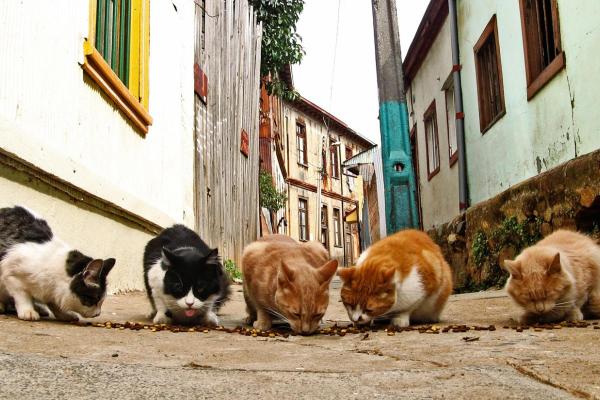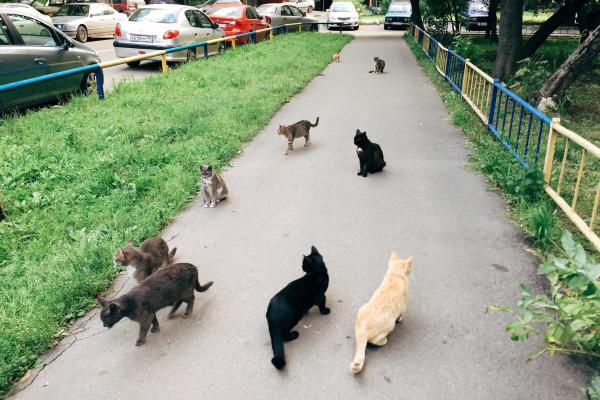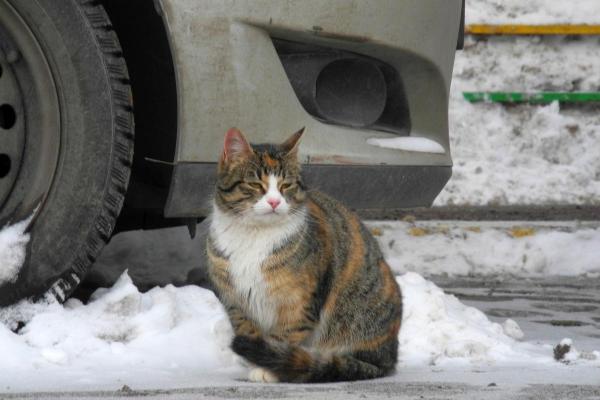
Any animal lover who walks out on the street and sees a stray cat in a bedraggled state will feel a certain amount of pity. When they come to our property, we may even feel compelled to feed them since we have the resources. AnimalWised asks should you feed stray cats? In asking the question, we are not wanting to know whether we should help stray cats. If you love animals and care about their well-being, then wanting to help them should be fairly straightforward. We want to know whether feeding feral cats is good for them or whether there are better ways to help cat populations at large.
Is it legal to feed stray cats?
In many countries, it is illegal to feed stray cats at all. This will be governed by a local legislation and can vary by region. The reason for this is due to health and safety. Stray and feral cats often live in colonies. Within these colonies, a lack of veterinary attention and poor living conditions combine to cause poor hygiene among the felines. The stray cats can then spread disease to humans, as well as parasites and other health issues.
When someone in a neighborhood decides they want to feed cats, they usually do so in a certain place. This can be in their backyard, in front of a building or elsewhere in a built-up area. While the person feeding the feral cats might feel comfortable and take precautions to prevent health issues, the same may not be the case for everyone else. In fact, many of the reasons for laws concerning stray and feral cats are due to this problem.
However, it is only the minority of regions in the US which have specific laws against feeding stray cats. Most of the legislation has to do with Trap-Neuter-Release (TNR) programs. These are locally governed programs which trap feral cats and neuter them before setting them back into the wild. This is mainly to help control overpopulations, but also helps with issues such as aggression in stray cats.
Some states such as Texas (although it can differ by county or even city) have very interesting legal issues when it comes to feeding feral cats. These laws have a specific definition in terms of ‘custody’. While it is not illegal to feed a stray cat, it is illegal to stop feeding them. This is because the cat you feed may be considered in your custody and abandoning said cat is illegal.
Other countries are more strict. For example, in Spain it is a finable offence to feed stray cats with fines potentially amounting to hundreds of Euros. An issue with these laws is that they are not always enforceable. It is difficult to catch people in the act and many municipalities do not have the resources to prosecute.

Should you feed stray cats?
The first thing you need to determine is whether there is a law prohibiting the feeding of stray cats. If the answer is in the affirmative, then you should not feed them. This is breaking the law and can result in serious fines which usually increase with subsequent infractions.
If it is not illegal to feed stray cats where you live, it still may not be advisable to do so. This is not because we want to wish harm on the cats. It is quite the contrary. Local animal services should have specific TNR programs for feral cats and a system set in place to help animal welfare. This includes protecting the cats themselves, as well as other animals in the local ecosystem which may be harmed when we attract stray cats with food.
Although many local animal services are underfunded, they have should have a mandate to protect the animals within their jurisdiction. When citizens take the responsibility onto themselves, they may harm the systems set in place to help. This is particularly the case when they are inconsistent. If you decide to feed stray cats one day, it is likely they will continue to show up. If you then stop feeding them, the cats may remain, but do not have the resources to survive.
Another reason you probably shouldn't feed stray cats is a health and hygiene issue. Attracting feral cats will likely spread disease and parasites. If you live in an area with a lot of children or other vulnerable people, you could be creating a public health risk. Although you may be happy to have lots of stray cats on your property, your neighbors may not be as accommodating. In these cases, it is usually best to shoo the stray cats away.
The general rule is that you should not feed stray or feral cats, even if it is not illegal to do so. There may be some exceptions. For example, if you live in the country with few people close to your property, feeding stray cats might be fine if it is legal to do so. In fact, in these cases, the stray cats may prove useful if they keep vermin away. You will still need to use preventive measures to avoid disease and be very careful if you think a cat may be rabid.

How to protect stray cats
As we have stated above, your local animal services should be in charge of helping feral cat populations. Not only do they implement TNR programs, but they are usually in charge of feeding, protecting and rehoming feral cats. Not all local governments will be the same, however. Unfortunately, many cats are euthanized when these local bodies do not have the resources or when animal shelters are overpopulated.
If you see there are more feral cats than usual or local stray cat populations seem to be causing a nuisance, it is worthwhile investigating your local animal services. These services are run by governments which are there to serve the people, so they need to be held up to scrutiny. You can speak to the animal services directly or speak to your local representative if you need to raise an issue.
When you are in a position where you may be able to legally feed stray cats without causing any of the problems detailed above, you should only feed them a quality commercial cat feed. This can be wet, but it is more expensive and you will need to ensure you remove it after a few hours as it is not good to leave cat food like this outdoors. It can attract other animals and pests. You should not feel stray cats the following:
- Homemade food
- Human food
- Raw meat or fish
- Expired foods
- Vegetables, fruits or anything which is not part of a cat's normal diet
If you feel compelled to help stray and feral cats, one of the most helpful things you can do is donate your time. There is likely an animal charity or a volunteer program in your local areas which could use your assistance. By giving some of your time, you can help improve the life of cats and give them practical help.
For those which have the resources, you can even adopt a cat from a shelter. A feral cat will not be able to live in a domestic environment, but many stray cats have been abandoned and may be able to live in a home with people. This will depend on the individual. Of course, if you find a stray cat, you will need to determine whether they have an owner. Trap the cat safely and take them to a veterinarian or an animal shelter who will be able to assess them.
When you find a stray cat, you should also check local listings to see if there are missing cat posters or other information. If you can confirm the cat does not have an owner or an owner is inaccessible, we can think about adopting the stray cat into our family.

If you want to read similar articles to Should You Feed Stray Cats?, we recommend you visit our Facts about the animal kingdom category.